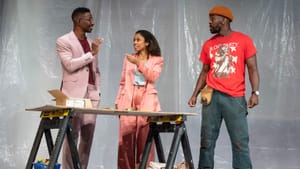Stay in the Loop
BSR publishes on a weekly schedule, with an email newsletter every Wednesday and Thursday morning. There’s no paywall, and subscribing is always free.
No place like home
The Public Theater presents James Ijames’s Good Bones

James Ijames explores the soul of a neighborhood in Good Bones, his follow-up to the Pulitzer Prize-winning Fat Ham. Despite a generally well-acted and handsomely designed production at New York’s Public Theater, the work too often feels like a statement in search of a play.
As a writer, Ijames has always balanced the poetic and the practical. He finds intriguing dramatic turns within intricately structured plots. Good Bones frequently seems shaggy and underdeveloped, though, its ideas bumping up against each other rather than coalescing. The script comes across as prosaic one moment, elliptical the next.
Exploring gentrification
Commissioned by the Studio Theatre in Washington, DC, where it premiered last summer, Good Bones takes on the weighty subject of gentrification. Aisha (Susan Kelechi Watson) returns to her home neighborhood, intent on changing its rough streets for the better—or so she thinks. She brings along her husband Travis (Mamoudou Athie), an aspiring chef who grew up in a more affluent environment.
Aisha’s remodeling project limns public and private spheres. She works for a company that seeks to place a sporting venue in the heart of the neighborhood, displacing many longtime residents along the way. (There are shades here of the ongoing debate over 76 Place at Market East, which would surely be on Ijames’s mind as a Philadelphia resident.) At home, she and Travis put their energy into rehabbing a rundown house into an abode befitting their upwardly mobile trajectory. They do so with the help of Earl (Khris Davis), a contractor with deep ties to the community.
The play focuses mainly on the divergent attitudes Aisha and Earl hold toward the place that raised them. They grew up in the same housing project—he remembers it fondly, her less so—but have fundamentally different views for the future. Earl views Aisha’s choices as a betrayal of the community, while Aisha finds his romantic view of a downtrodden place shortsighted.
This conflict should provoke tension, but the script spins its wheels in these interactions, using the characters as mouthpieces rather than human beings. By the time a genuinely taut moment arrives, it feels underwhelming and anticlimactic. Ijames doesn’t give his characters much room to breathe or grow, giving the impression that Aisha and Earl are simply talking past each other.
Vague intentions
Watson and Davis make great foils for each other—her edginess offsets his humor. (Davis, a Camden native, began his career working in the Philadelphia theater scene.) Travis comes across as little more than a whiny interloper, and Athie plays him as such. A fourth character—Earl’s sister Carmen (Téa Guarino), a student at UPenn—barely functions as a plot device. She seems to only exist to provide a fourth body for an elongated dinner scene that’s the crux of the play.
Director Saheem Ali stages that scene with some spark, but otherwise, the production drags across nearly two intermission-less hours. Ijames’s script also includes a hoary supernatural element reminiscent of Stephen Karam’s The Humans—you’re not sure whether it’s genuine or imagined, a manifestation of psyche. This allows for some arresting lighting effects by Barbara Samuels and eerie sound cues from Fan Zhang, but like much else in this play, the intention and meaning remain vague.
Ijames doesn’t want for talent or creativity, but Good Bones frequently resembles the stark-white kitchen set designed by Maruti Evans: elegant, sterile, bland. The bones are there, but they’re in need of another renovation.
What, When, Where
Good Bones. By James Ijames, directed by Saheem Ali. Through October 27, 2024, at the Public Theater’s Martinson Hall, 425 Lafayette Street (at Astor Place), New York, New York. (212) 967-7555 or publictheater.org.
Accessibility
The Public Theater is a wheelchair-accessible venue. There will be an open-captioned performance of Good Bones on Saturday, October 5, at 1:30pm; an audio-described performance on Sunday, October 6, at 1:30pm; an ASL-interpreted performance on Thursday, October 10, at 7:30pm; and a mask-required performance on Sunday, October 13, at 1:30pm.
Sign up for our newsletter
All of the week's new articles, all in one place. Sign up for the free weekly BSR newsletters, and don't miss a conversation.

 Cameron Kelsall
Cameron Kelsall